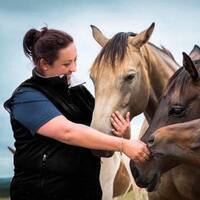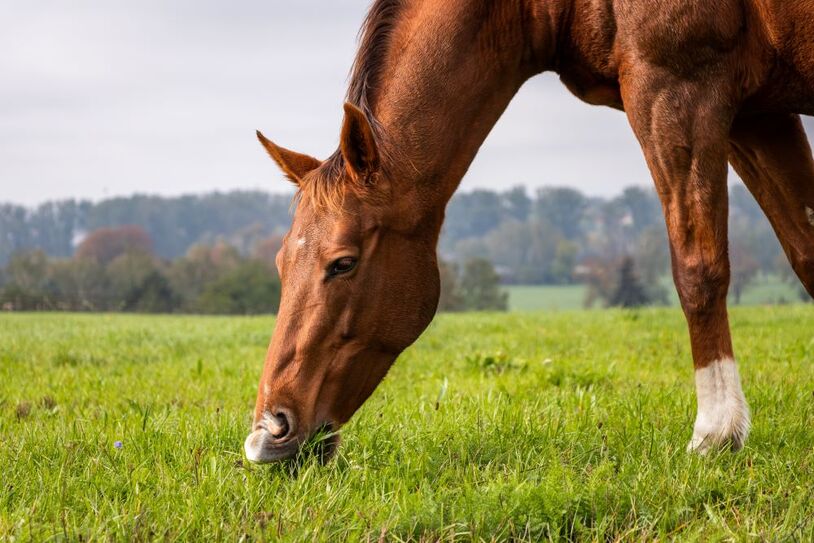In an ever-evolving equine industry, the role of an equine nutritionist has emerged as a pivotal figure in ensuring the health, performance, and overall well-being of horses. From elite athletes to cherished companions, horses require a balanced and tailored diet to thrive. Do you know exactly what an equine nutritionist does and why their expertise might be essential for you?
In this article, we will explore the vital role of an equine nutritionist, shedding light on the unique skill set, responsibilities, and benefits they bring to horse health. Whether you're a seasoned equestrian or new to the world of horse care, understanding the importance of equine nutritionists and why you should collaborate with one could make a significant difference in your horse's life.

What is an equine nutritionist?
An equine nutritionist is someone who specialises in the diet and feeding of horses. They may work in research or education, within the feeds or commercial sector, or even with individuals as an independent consultant. They should have the credentials and experience to design and carry out nutritional trials, provide evidence-based training, formulate individual feeds for commercial production, calculate the precise nutritional needs of individual horses and be able to devise a suitable ration for that horse and owner. An equine nutritionist should also be able to work collaboratively with a range of other professionals within a horse's team, such as veterinary staff, farriers, and trainers, to ensure positive outcomes, overall health and longevity. An equine nutritionist has a very specialised role that requires a combination of education and experience, and they can be a valuable resource to horse owners and veterinary staff [1].
What qualifications should an equine nutritionist have?
One of the most common routes to becoming an equine nutritionist is attaining a relevant bachelor's degree. Following graduation, progress into employment within an equine feed company to gain the necessary and valuable industry knowledge and experience. Unfortunately in the UK, someone assigning themselves the title of ‘Equine nutritionist’ doesn’t legally require any academic qualifications, specific knowledge or experience, as it stands. This can leave owners in a precarious position when seeking feeding advice for their horses.
Several countries have different resources to support owners in finding validated equine nutritionists, in the UK that is the Association for Nutrition (AfN). The AfN sets and defines the standard of evidence-based nutrition and holds the list of registered nutritionists [1]. These nutritionists are identifiable through the letters RNutr after their name, or by searching the register (https://www.associationfornutrition.org/register/search-the-register). To become a registered nutritionist they will have gone through an accredited degree program and gained several years of experience. An alternative method to be recognised by the AfN is via a process assessing their qualifications (bachelor and usually master degrees), knowledge, experience, ability to demonstrate evidence of ethical behaviours, and be vouched for by an existing RNutr. Once accepted onto the register these nutritionists are held to the AfN standards of ethics, conduct and performance. If they are working independently, they must also adhere to the AfN standard for freelance and independent practice.
Undoubtedly, there are many unregistered equine nutritionists with the adequate knowledge and experience to do the job. However, the onus remains on the owner to critically evaluate the education and experience of those they employ to work with their horses or from whom to seek advice [2].
What are the benefits of working with an equine nutritionist?
An equine nutritionist can support an owner and play a pivotal role in ensuring optimal care and management for their horse. An optimally designed feeding ration can support the management of current diseases, provide the foundations for overall health and performance, and improve quality of life and long-term health [2]. Before an equine nutritionist can design a suitable diet recommendation they will need to gather certain information, such as:
-
Age, breed & temperament
-
Clinical history
-
Body weight & condition
-
Work & energy levels
-
Daily management
-
What, if anything, needs changing or improving
From this information, the equine nutritionist can establish the horse's required levels of energy, fibre, protein, carbohydrates, vitamins, minerals and essential amino acids. This enables them to calculate a ration capable of meeting all those requirements and one suitable for their daily management, i.e. turned out or stabled.
A correctly designed ration can help to ensure a healthy body condition is maintained, insulin function is assisted, athletic performance is supported, optimal growth rates are maintained in young horses, brood mares are capable of producing good colostrum and sufficient milk, and the risk of certain diseases or injuries is kept to a minimum. For diseases such as Equine Metabolic Disease or laminitis, a correctly designed feeding ration is key to managing and controlling the potential impact on the horse's health and well-being. An equine nutritionist can assist an owner by ensuring that their horses’ diet is capable of doing everything that it should. Another benefit to working with an equine nutritionist is that diet can encourage suitable behaviour or energy levels in work. Depending on the horse's temperament, work levels, and rider's ability, the type of energy that a diet should provide varies. A rider wanting more ‘go’ energy will require a diet tailored to provide higher levels of quick-release energy. Whereas, a less confident rider or one with a spooky horse will probably require a diet that provides a higher level of slow-release energy.
An equine nutritionist will tailor a diet suitable for both horse and rider.
References
[1] https://www.associationfornutrition.org/
[2] Pratt-Phillips, S.E. & Liburt, N.R. 2024 The role of an equine nutritionist in equine health, performance and wellbeing: Ideas stemming from an Equine Science Society Symposium Workshop, Journal of equine veterinary science, doi:https://doi.org/10.1016/j.jevs.2024.105047






